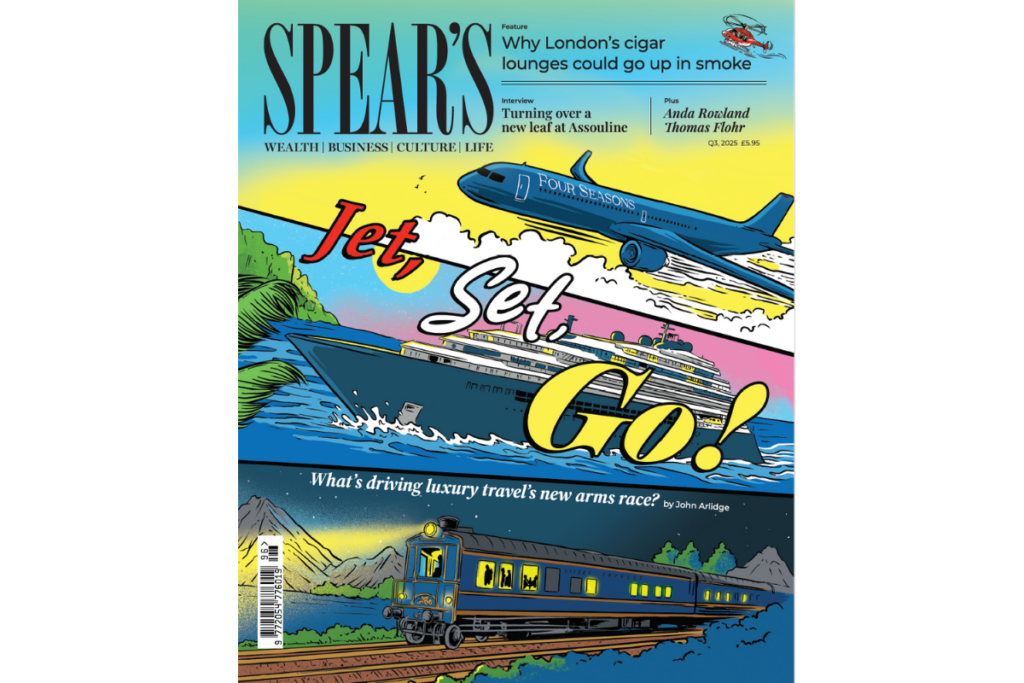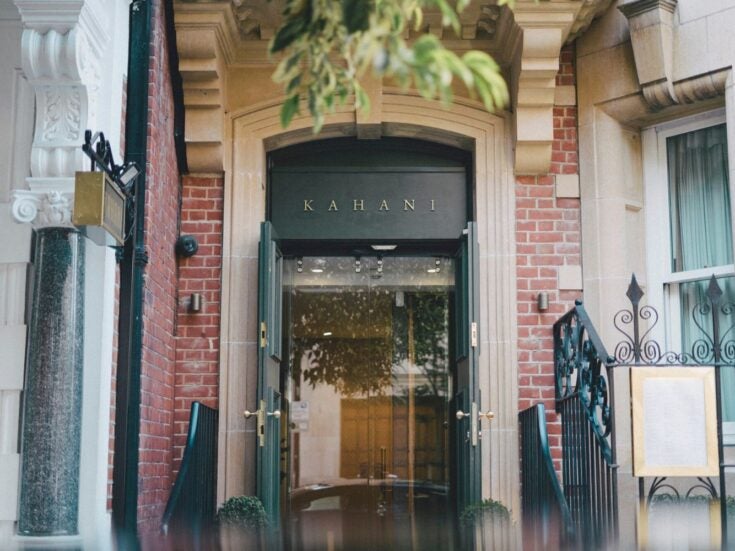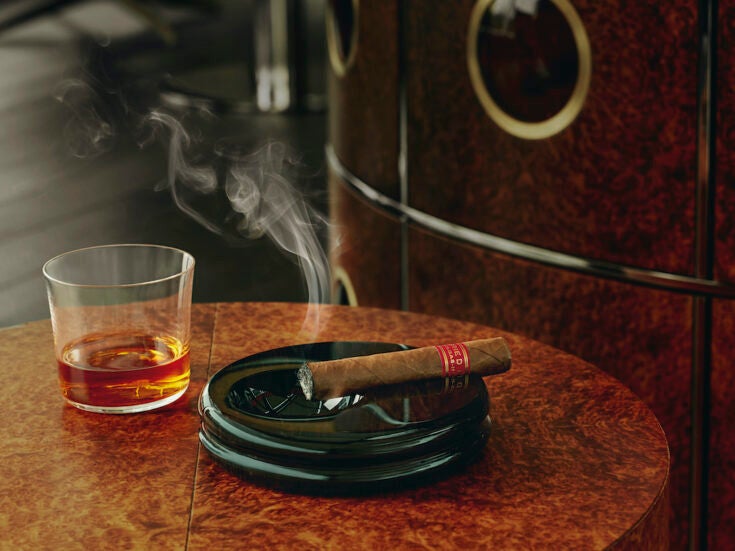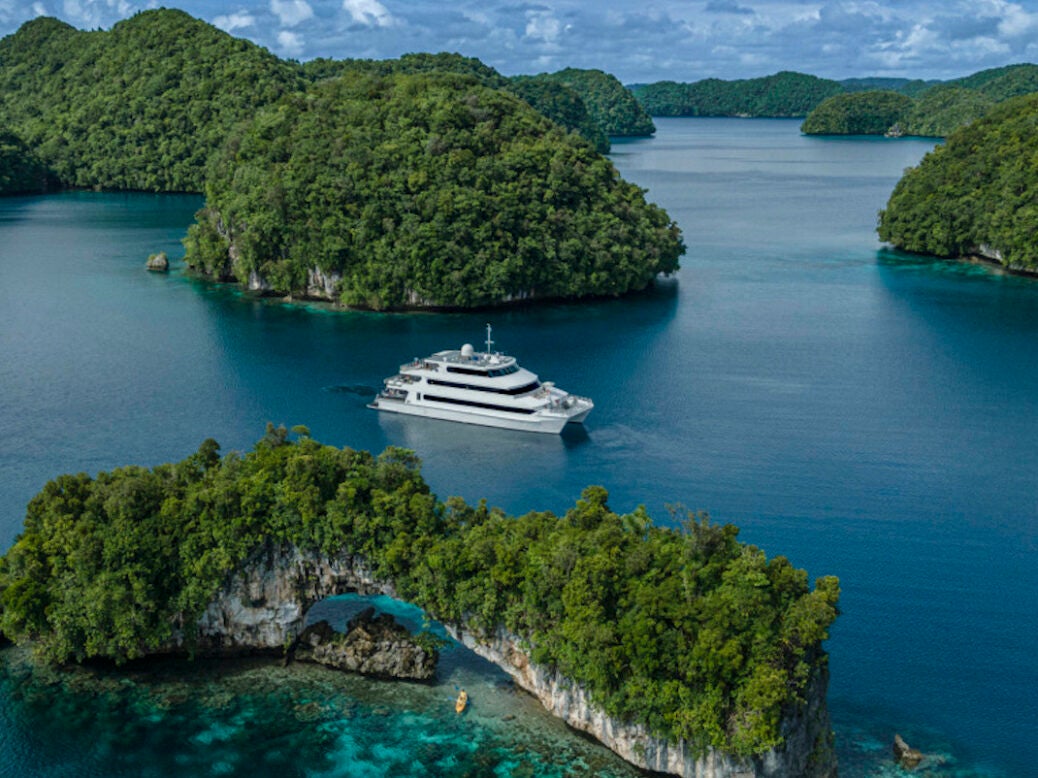
In American Caesar, his epic biography of General MacArthur, who commanded the USA’s Pacific campaign in the Second World War, William Manchester points out that among many challenges that the US troops faced besides the enemy – earthquakes, typhoons, disease, sharks, New Guinea head-hunters and soaring temperatures – was geography. Few troops had a clue where they were, and those who thought they did soon found that in fact they didn’t, and that Island X was in fact Island Y.
Little has changed, at least among Westerners. Take Palau. One friend thought it was a kind of rice. On the map, Palau indeed resembles a scattered dish of pilau. A tiny 340-island archipelago in the west Pacific (population 17,000), it is located 1,600km east of the Philippines and 800km north of New Guinea. Its closest neighbours are the equally obscure Federated Islands of Micronesia: Yap, Chuuk, Pohnpei and Kosrae. ‘Remote’ hardly captures Palau’s exclusion and isolation.
Such as it is, Palau is not the tourist hotspot that its natural charms might have allowed. It was welcoming just 150,000 visitors per year before the pandemic. Today the numbers are lower still: in 2024 just 65,000 showed up, of which just 7,000 were Westerners. (By comparison, the equivalent figure for Mauritius, which is roughly the same size, was 1.38 million.)
[See also: ‘The island was a love story’: Richard Branson on his private Caribbean retreat, Necker]
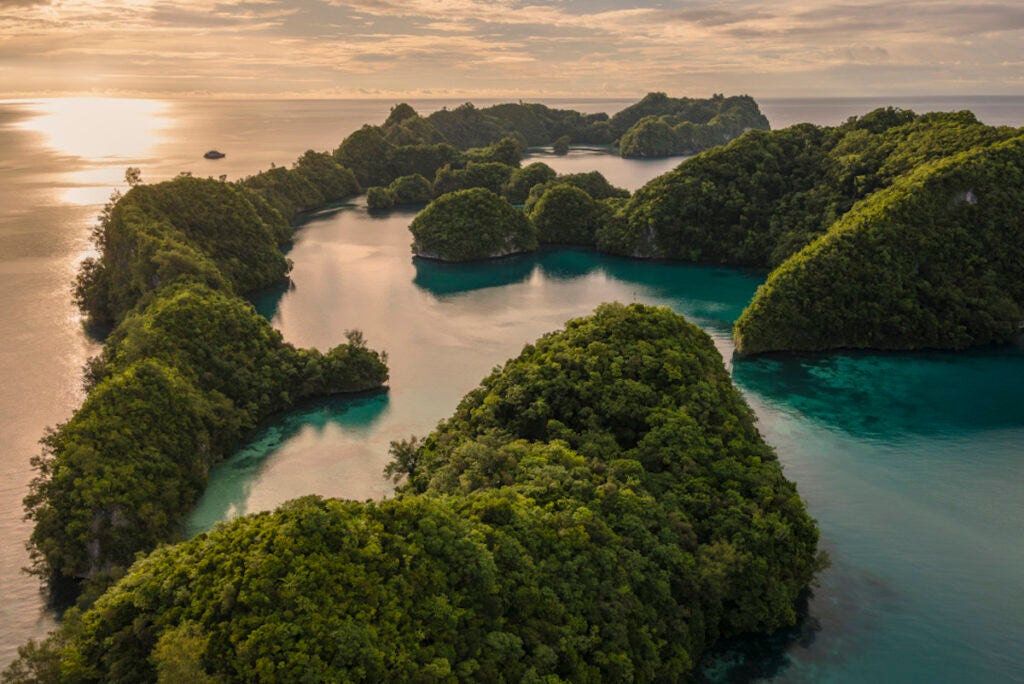
But in this decline, Palau’s president Surangel Whipps Jr (more on him later) and others have spied an opportunity to embrace a new model rooted in exclusivity, environmental stewardship and cultural authenticity. It must be said that it is starting from a low base. The only hotel of note, the Palau Pacific Resort, is, according to one local, ‘let down’ by its food and beverage.
The government, therefore, is actively encouraging the type of high-end developments that have the potential to attract the affluent, responsible travellers who can help establish the Pacific nation as a torchbearer of luxury tourism that harmonises with nature. BS Ong, a Malaysian-Singaporean tycoon and hotel investor, is not only on board; he is leading the way. The only recognised international hotel group that has a presence here is Four Seasons, in which Ong is a big investor. For the moment, that presence is in the form of the Four Seasons Explorer, a 39-metre dive catamaran, which probes the best sites and most scenic locations on a weekly cycle. Soon, however, the group plans to open a 50-room resort.
Palau’s archipelago melds volcanic and coral islands, representing different stages and types of island formation, encircled by one of the world’s best-developed reef systems. It sits on the Philippine plate, near the join with the Pacific and the Australian plates. Seismic forces are pushing Palau upwards at one metre every 2,000 years. Moating the archipelago, deep trenches score the ocean floor. As the naturalist Augustin Krämer wrote, Palau is surrounded by ‘the strangest submarine geomorphic conditions on Earth’.
Meanwhile, Palau is simultaneously washed by currents from the Philippines, Indonesia and Micronesia. The combination of exotic geology, shifting plates, deep trenches, strong tides and tight environmental protection creates a natural laboratory for studying island formation, reef development and marine life.
[See also: How citizenship is becoming a luxury asset]
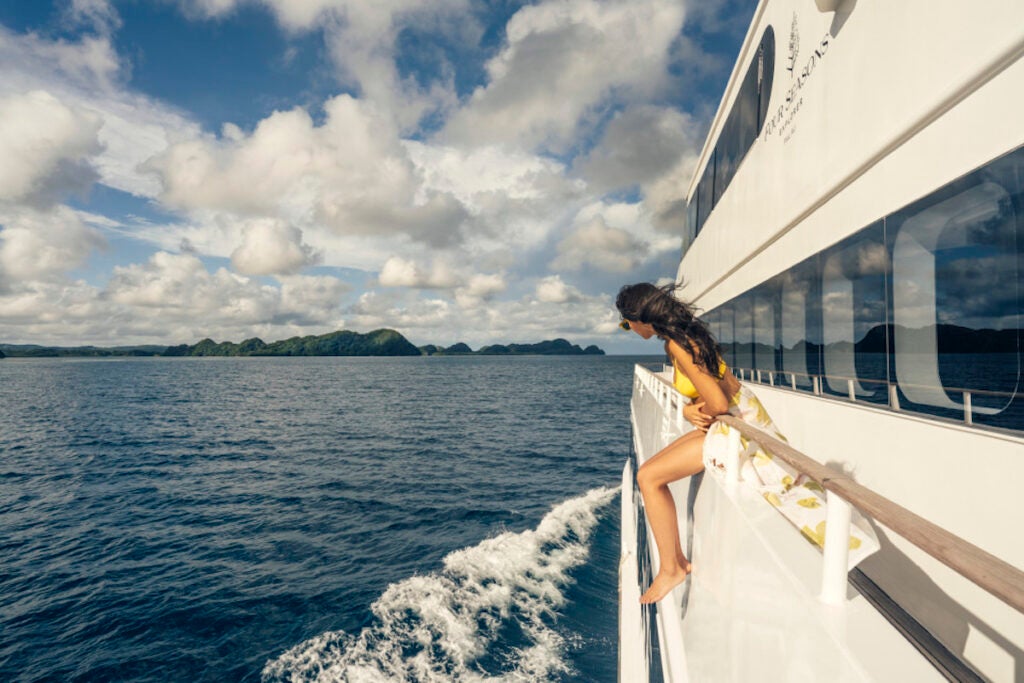
I find the Four Seasons Explorer anchored in the lagoon. In live-aboard dive-boat terms, ‘luxury’ usually means electricity and flushing loos. The Explorer, however, takes luxury to a new dimension. The dive deck would have turned Jacques Cousteau mango-green with envy. The kitchen is outstanding, although two regional delicacies that were in season – fruit-bat soup and green turtle – were strangely off the menu.
The predominantly Maldivian staff are helpful and friendly. The 10 cabins and one suite are comfortable and pared down. A bar/lounge/dining room opens on to a small rear deck, where morning yoga takes place at 5.30am beneath a shockingly bright moon. Simple, to the point, the Explorer has been created for people who have no wish to see their lifestyle compromised merely by diving, snorkelling and exploring. My fellow passengers came from England, the Philippines and Germany.
Palau’s most distinctive feature is its labyrinth of rock islands: hundreds of tiny, mushroom-shaped limestone crags topped with thick jungle. Formed by uplift and erosion, these camouflaged Martello towers have an unearthly beauty. You just want to drift and gaze and drink them in. There is a tantalising absence of humanity; the only sound is birdsong. If you are a deeply sophisticated, low-maintenance, dauntless traveller who appreciates nature and seeks solitude, purity and a holiday from other people, you will love Palau. For dumbfounding aerial views, Pacific Mission Aviation, a charitable organisation, operates a scenic flight using an open-sided Cessna 206.
One morning, Oscar, the resident marine biologist, takes me for a snorkel. We jump into a teeming aquarium of weirdly sculpted corals: giant cauliflowers, petrified human brains and rock-like objects cloisonné with geometrical patterns. By my conservative estimate, I saw six million species of ridiculously beautiful iridescent fish greeting me with open-mouthed astonishment. Depending on who you ask, Palau officially has between 746 and 1,300 species (Hawaii has to make do with 300). ‘Enough to keep the apex predators, sharks and saltwater crocodiles busy,’ says Oscar. Back on board, we sail to an outer island.
[See also: Super-rich are giving away more of their money than ever before]
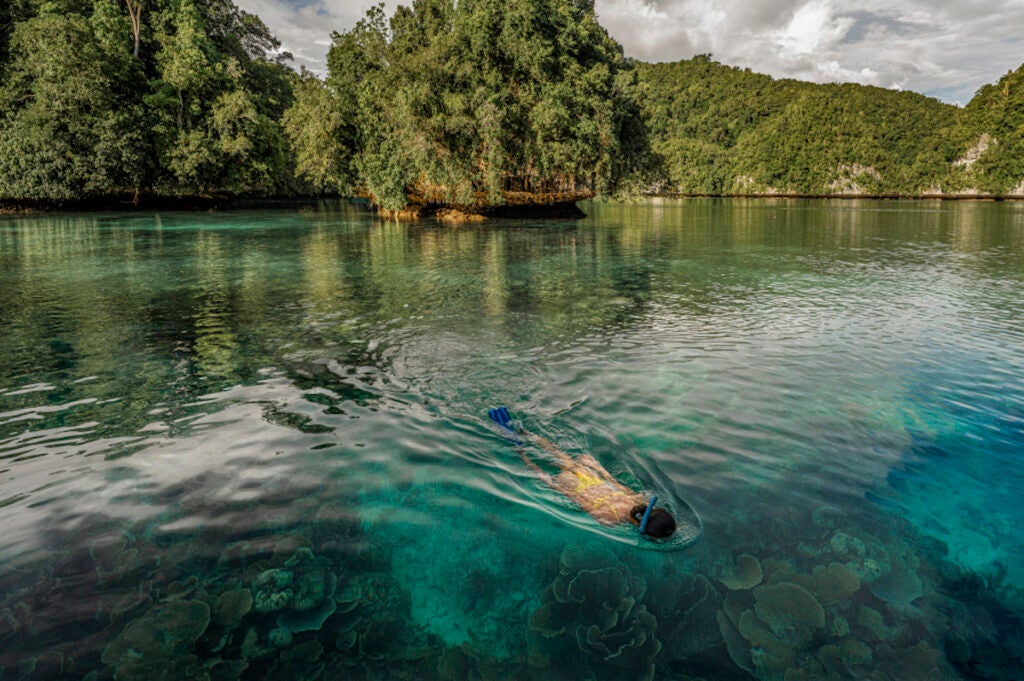
Palau was roused from ‘its enchanted sleep to the light of reality’, as Krämer put it, when, on the night of 10 August 1783 the Antelope, a 300-tonne East India Company packet, struck coral. This was Ulong Island. Finding the Palauans friendly, Captain Wilson and his crew enlisted their help to build a new ship from the old. He made it back to England, taking with him the King of Ulong’s son Prince Lee Boo, who promptly died of smallpox. The episode, however, planted Palau on the colonial map.
‘People came to us from Portugal, Germany, England, Spain, Japan and finally the USA,’ says ‘Fonzie’, a kinsman of Prince Lee Boo, who works as a guide. ‘After the war we became Westernised, although the Spanish had already brought Catholicism.’ He adds that Palau’s original settlers came 4,000 years ago from Taiwan, the Philippines and Indonesia: ‘We are part of an ancient Asia Pacific civilisation.’
Time for another snorkel! One of Palau’s 13 species of shark swims by (it was declared a sanctuary for the animals in 2009). Oscar rehearses me on the correct etiquette: ‘Stay still. Look the shark in the eye. If it approaches, deflect its snout. Sharks have negative buoyancy, so they must keep swimming.’
A spotted eagle ray glides past. In Palauan native culture, eagle rays sit alongside the banded sea krait and the leopard shark in a pantheon of demigods. As one Palauan put it, ‘We have demigods, but we also believe in God.’
[See also: The top private members’ clubs in London]
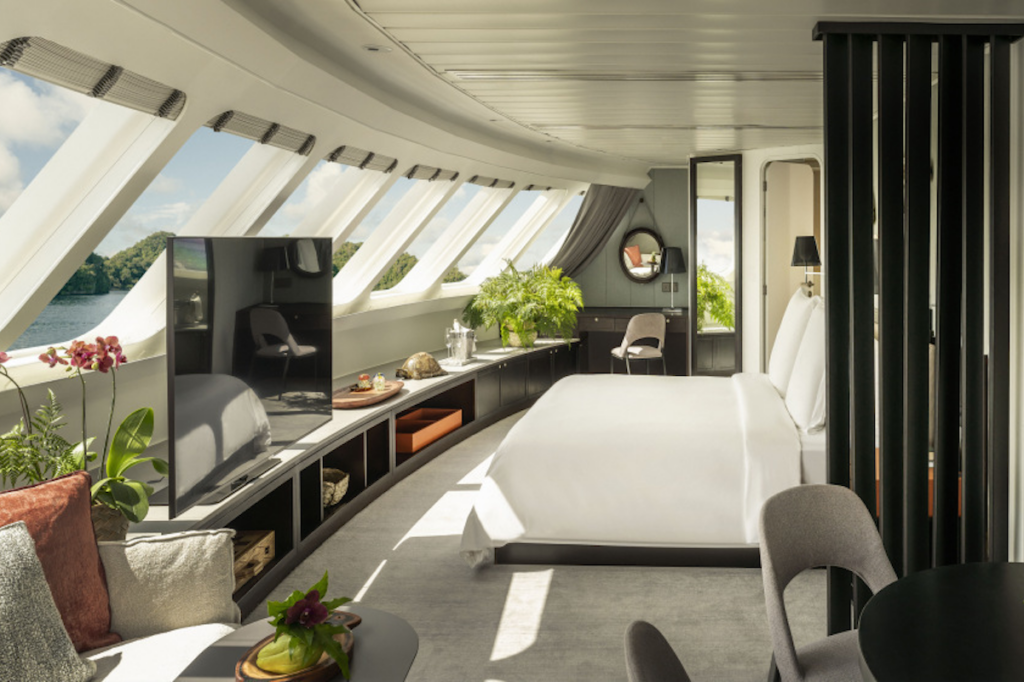
Palau claims some of the greatest dive sites. Blue Corner is an underwater coral peninsula where powerful currents bring in heavy traffic of ‘big stuff’: schooling sharks, Napoleon wrasse, turtles, dogtooth tuna and shoals of barracuda. Big Drop Off, one of Cousteau’s favourite cliff dives, is where, just offshore, the water plunges to ocean depth. German Channel has a piquant backstory. When they occupied Palau (1899 to 1914), the Germans blasted a shortcut through the reef. Divers forgave the Kaiser when they found huge manta rays enjoying the shortcut.
The Palauan idyll was shattered by two of the bloodiest battles of the Second World War. After General MacArthur abandoned the Philippines to the Japanese in 1942, he declared: ‘I will be back!’ Two years later, the Americans did come back. After taking the Marshall Islands, they approached Palau, where the Japanese had dug themselves in on the islands of Angaur and Peleliu. American victory took 74 days and nearly 13,000 Japanese and 2,500 American lives.
Today, crumbling bunkers and rusting tanks litter the jungle; fish play peekaboo in wrecked ships and aeroplanes. Thousand Man Cave, the Japanese redoubt on Peleliu, is strewn with bottles, utensils, weapons and medical equipment. I return to the wanton luxury of the Explorer.
While Peleliu is still being de-mined, the US military is restoring the Japanese runway and installing radar. ‘Our location and position attract interest,’ says Norman Ngiratecheboet, state governor of Airai. ‘But we are friends to all, enemy to none.’
In the postwar settlement, Palau became a US vassal until ‘independence’ in 1994, qualified by a Compact of Free Association agreement that allows the USA rights over Palau in return for funding and defence. Given the unpredictable currents at the White House, it is perhaps not surprising that Palau wants to strengthen economic independence by boosting tourism, which represents 45 per cent of GDP.
[See also: A Roman Renaissance: Six Senses Rome redefines urban luxury]
‘Welcome to the Pacific in microcosm!’ says Surangel Whipps Jr, the president, when we meet in his souvenir-filled office in Koror, the main city. ‘Kayangel, the northernmost atoll, is like the Marshall Islands: low-lying atolls and islands formed by coral reefs growing on submerged volcanoes. Babeldaob, the largest island, is like Hawaii, but older; Hawaii doesn’t yet have a big barrier reef. The limestone rock islands are like Raja Ampat in Indonesia. In the south, Peleliu and Angaur are low-lying like Guam. In this tiny place, you have the whole of the Pacific.’
The president sits atop a hybrid power structure of 16 states each with their own ancient clan system, on which is superimposed a US-style democratic constitution. While Whipps handles domestic issues, it is said the US ambassador influences Palau’s foreign policy, such as its pro-Taiwan stance.
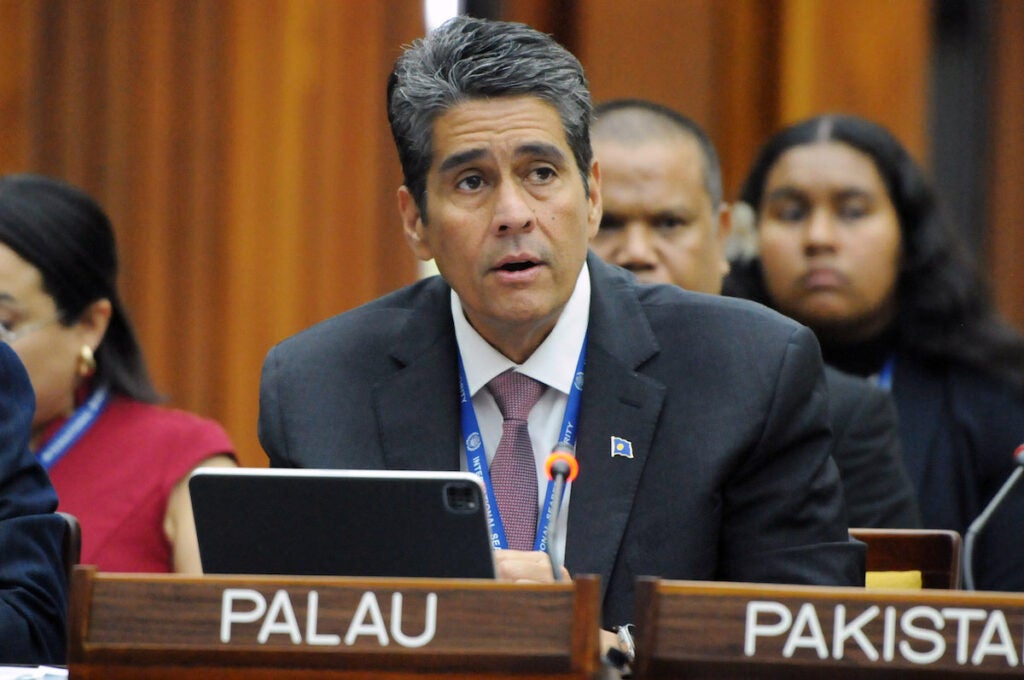
‘China doesn’t want diplomatic relations with us,’ says Whipps. ‘We understand that. Oh, they try to entice us. One Chinese diplomat said, “I can get you one million tourists and build all the hotels you want.” We don’t need that. We want people to leave footprints that disappear, not bad memories.’
[See also: Egypt’s history on a cruise down the Nile]
Whipps is after the carriage trade. He rattles off a list of shiny resort brands he’d like: Aman, Ritz-Carlton, St Regis and the rest. But there are a number of constraints on any sort of development. Almost everything – materials, labour, food, beverages and so on – must be imported via long supply chains vitiated by few flights and an airport runway that takes nothing larger than an A320 or 737; refuelling costs are high.
At present, most hotels on Palau operate at 10-40 per cent of capacity. It’s likely that new entrants from the president’s list would be ‘hermetically sealed’ and run by foreigners since Palauans are ‘generally not service-oriented’. What’s more, Palau’s remoteness means it would be unlikely to attract many repeat visitors, so that it would have to market itself continually to fill up new lodgings.
Nevertheless, Palau can provide a kind of ‘luxury’ that has little to do with opulence and everything to do with the untouched beauty of the natural environment, a deep cultural heritage, as well as a commitment to preserving one of Earth’s last great paradises. Perhaps it will even serve as a trump card to silence all those people who drone on about the Maldives, which received a far less exclusive 1.8 million tourists in 2023.
‘We have a saying,’ says Whipps, ‘“The land is our mother; the ocean our father.” They provide for us, care for us. We need to take care of them. That is how we continue to survive.’
This article first appeared in Spear’s Magazine Issue 96. Click here to subscribe
